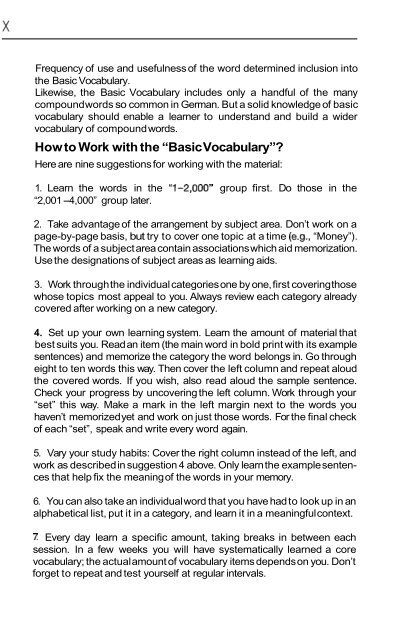- Seite 1 und 2: I. -l L L I
- Seite 3 und 4: LANGENSCHEIDT Basic German Vocabula
- Seite 5 und 6: Contents Who needs a “Basic Vocab
- Seite 7 und 8: 9 Environment .....................
- Seite 9 und 10: Who needs a “Basic Vocabulary”?
- Seite 11: In addition to the thematic present
- Seite 15 und 16: 11 Der Mensch 1 1 The Human Being 1
- Seite 17 und 18: 1 The Human Being stark [park] Adj,
- Seite 19 und 20: 1 Der Mensch 1 The Human Being 1 1.
- Seite 21 und 22: 11 Der Mensch I 7 I I 1 1.3 Geist u
- Seite 23 und 24: 11 Der Mensch 1 9 1 The Human Being
- Seite 25 und 26: erfassen [~a*'fas(a)n] v/t, erfasst
- Seite 27 und 28: 11 Der Mensch I 13 I I 1 The Human
- Seite 29 und 30: 11 Der Mensch I 15 I I 1 The Human
- Seite 31 und 32: lieb [li:p] A@. Sie hat mir einen l
- Seite 33 und 34: 11 Der Mensch I 19 1 The Human Bein
- Seite 35 und 36: Aufregung ['aufre:gug] ( -, -en exc
- Seite 37 und 38: 11 Der Mensch I 23 I I 1 The Human
- Seite 39 und 40: 1 The Human Being wohl [vo:~] Adl!
- Seite 41 und 42: 11 Der Mensch I 27 I I 1 The Human
- Seite 43 und 44: 11 Der Mensch 1 29 1 The Human Bein
- Seite 45 und 46: 12 Handlungen und Aktivitaten I 31
- Seite 47 und 48: einschlafen ['ainJla:f(a)n] VA., sc
- Seite 49 und 50: 12 Handlungen und Aktivitaten I 35
- Seite 51 und 52: 12 Handlungen und Aktivitaten I 37
- Seite 53 und 54: 12 Handlungen und Aktivitaten I 39
- Seite 55 und 56: 12 Handlungen und Aktivitaten I 41
- Seite 57 und 58: 12 Handlungen und Aktivitaten I 43
- Seite 59 und 60: 12 Handlungen und Aktivitaten I 45
- Seite 61 und 62: 12 Handlungen und Aktivitaten I 47
- Seite 63 und 64:
12 Handlungen und Aktivitaten I 49
- Seite 65 und 66:
12 Handlungen und Aktivitaten I 51
- Seite 67 und 68:
verteilen [f~a*'tail(a)n] V/t., ver
- Seite 69 und 70:
12 Handlungen und Aktivitaten I 55
- Seite 71 und 72:
12 Handlungen und Aktivitaten I 57
- Seite 73 und 74:
12 Handlungen und Aktivitaten 1 59
- Seite 75 und 76:
12 Handlungen und Aktivitaten I 61
- Seite 77 und 78:
12 Handlungen und Aktivitaten I 63
- Seite 79 und 80:
12 Handlungen und Aktivitaten I 65
- Seite 81 und 82:
eherrschen [bah~rJ(a)n] V/t., ref/.
- Seite 83 und 84:
gefaltet Er faltete die Zeitung und
- Seite 85 und 86:
12 Handlungen und Aktivitaten I 71
- Seite 87 und 88:
12 Handlungen und Aktivitaten I 73
- Seite 89 und 90:
12 Handlungen und Aktivitaten 1 75
- Seite 91 und 92:
Buch [bu:x] n, -(e)s, Bucher Ich le
- Seite 93 und 94:
12 Handlungen und Aktivitaten I 79
- Seite 95 und 96:
12 Handlungen und Aktivitaten I 81
- Seite 97 und 98:
12 Handlungen und Aktivitaten I 83
- Seite 99 und 100:
13 Sprache und Sprechabsichten 1 85
- Seite 101 und 102:
Witz [vits] m, -es, -e Mein Kolleae
- Seite 103 und 104:
13 Sprache und Sprechabsichten I 89
- Seite 105 und 106:
13 Sprache und Sprechabsichten 1 91
- Seite 107 und 108:
13 Sprache und Sprechabsichten I 93
- Seite 109 und 110:
13 Sprache und Sprechabsichten I 95
- Seite 111 und 112:
empfehlen [~m’pfe:l(a)n] v/t., em
- Seite 113 und 114:
13 Sprache und SF 3 Language and Sp
- Seite 115 und 116:
13 Sprache und Sprechabsichten I 10
- Seite 117 und 118:
13 Sprache und Sprechabsichten I 10
- Seite 119 und 120:
13 Sprache und Sprechabsichten I 10
- Seite 121 und 122:
13 Sprache und Sprechabsichten 1 10
- Seite 123 und 124:
13 Sprache und Sprechabsichten I 10
- Seite 125 und 126:
13 Sprache und Sprechabsichten I 11
- Seite 127 und 128:
13 Sprache und Sprechabsichten I 1-
- Seite 129 und 130:
13 Sprache und Sprechabsichten I 11
- Seite 131 und 132:
komisch [ko:miJ] Adj. Ich mag ihn n
- Seite 133 und 134:
unmoglich [un’m~ckliq] Adj. Wenn
- Seite 135 und 136:
Erlaubnis [~a*’laupnis] f -, kein
- Seite 137 und 138:
13 Sprache und Sprechabsichten I 12
- Seite 139 und 140:
13 Sprache und Sprechabsichten I 12
- Seite 141 und 142:
I I 14 Mensch und Gesellschaft I 12
- Seite 143 und 144:
Bruder [‘bru:da*] m, -s, Bruder M
- Seite 145 und 146:
Enkel [‘egk(a)l] m, -s, - Enkelin
- Seite 147 und 148:
Fremde [fremda] m/f -n, -n Unser Hu
- Seite 149 und 150:
14 Mensch und Gesellschaft 1 135 4
- Seite 151 und 152:
14 Mensch und Gesellschaft I 137 4
- Seite 153 und 154:
14 Mensch und Gesellschaft I 139 4
- Seite 155 und 156:
14 Mensch und Gesellschaft I 141 4
- Seite 157 und 158:
eschutzen [ba'Jyts(a)n] V/t., be- s
- Seite 159 und 160:
14 Mensch und Gesellschaft I 145 4
- Seite 161 und 162:
14 Mensch und Gesellschaft I 147 4
- Seite 163 und 164:
14 Mensct- I und Gesellschaft 14 4
- Seite 165 und 166:
14 Mensch und Gesellschaft I 151 I
- Seite 167 und 168:
14 Mensch und Gesellschaft I 153 4
- Seite 169 und 170:
15 Alltagswelt I 155 5 Everyday Lif
- Seite 171 und 172:
15 Alltagswelt 1 157 5 Everyday Lif
- Seite 173 und 174:
15 Alltagswelt I 159 heizen [haits(
- Seite 175 und 176:
15 Alltagswelt 1 161 5 Everyday Lif
- Seite 177 und 178:
15 Alltagswelt 1 163 5 Everyday Lif
- Seite 179 und 180:
1 15 Alltagswelt I 165 5 Everyday L
- Seite 181 und 182:
15 Alltagswelt I 167 I 5 Everyday L
- Seite 183 und 184:
15 Alltagswelt I 169 5 Everyday Lif
- Seite 185 und 186:
Anzug [‘antsu:k] m, -s, Anzuge Er
- Seite 187 und 188:
15 Alltagswelt 1 173 5 Everyday Lif
- Seite 189 und 190:
15 Alltagswelt I 175 5 Everyday Lif
- Seite 191 und 192:
Braten [bra:t(a)n] m, -s, - Der Bra
- Seite 193 und 194:
15 Alltagswelt 1 179 5 Everyday Lif
- Seite 195 und 196:
Schnitte [‘Jnita] f -, -n slice n
- Seite 197 und 198:
Kohl [ko:l] m, -(e)s, kein PI. In u
- Seite 199 und 200:
15 Alltagswelt I 185 5 Everyday Lif
- Seite 201 und 202:
15 Alltagswelt I 187 5 Everyday Lif
- Seite 203 und 204:
15 Alltagswelt I 189 5 Everyday Lif
- Seite 205 und 206:
16 Wirtschaft und Verwaltung I 191
- Seite 207 und 208:
16 Wirtschaft und Verwaltung I 193
- Seite 209 und 210:
16 Wirtschaft und Verwaltung I 195
- Seite 211 und 212:
16 Wirtschaft und Verwaltung I 197
- Seite 213 und 214:
16 Wirtschaft und Verwaltung I 199
- Seite 215 und 216:
Service [‘z~:a*vis] m, -s, kein P
- Seite 217 und 218:
16 Wirtschaft und Verwaltung 1 203
- Seite 219 und 220:
16 Wirtschaf? und Verwaltung I 6 Bu
- Seite 221 und 222:
16 Wirtschaft und Verwaltung 1 207
- Seite 223 und 224:
Landwirtschaft [IantvirtJaft] f -,
- Seite 225 und 226:
16 Wirtschaft und Verwaltung I 211
- Seite 227 und 228:
16 Wirtschaft und Verwaltung I 213
- Seite 229 und 230:
16 Wirtschaft und Verwaltung I 215
- Seite 231 und 232:
16 Wirtschaf? und Verwaltung 1 217
- Seite 233 und 234:
telegrafieren [telegra'fi:ran] Vh.,
- Seite 235 und 236:
16 Wirtschaft und Verwaltung 12001
- Seite 237 und 238:
16 Wirtschaft und Verwaltung I 223
- Seite 239 und 240:
16 Wirtschaft und Verwaltung 1 225
- Seite 241 und 242:
16 Wirtschaft und Verwaltung 1 227
- Seite 243 und 244:
17 Kunst und Interessen I 229 7 The
- Seite 245 und 246:
17 Kunst und lnteressen I 231 7 The
- Seite 247 und 248:
17 Kunst und lnteressen I 233 7 The
- Seite 249 und 250:
17 Kunst und lnteressen I 235 7 The
- Seite 251 und 252:
[ 7 Kunst und Interessen] 237 7 The
- Seite 253 und 254:
- I I 17 Kunst und lnteressen I 239
- Seite 255 und 256:
17 Kunst und lnteressen I 241 7 The
- Seite 257 und 258:
udern [ru:da*n] V/t., i., ruderte,
- Seite 259 und 260:
18 Offentliches Leben I 245 8 Publi
- Seite 261 und 262:
Parlament [parla'ment] n, -(e)s, -e
- Seite 263 und 264:
18 Offentliches Leben I 249 8 Publi
- Seite 265 und 266:
18 Offentliches Leben I 251 8 Publi
- Seite 267 und 268:
Propaganda [propa’ganda] f -, kei
- Seite 269 und 270:
Unterdruckung [unta*’dryku~] f -,
- Seite 271 und 272:
Widerstand ['vi:de*Jtant] m, -(e)s,
- Seite 273 und 274:
18 Offentliches Leben I 259 8 Publi
- Seite 275 und 276:
Gewissen [ga’vis(a)n] n, -s, kein
- Seite 277 und 278:
18 Offentliches Leben I 263 8 Publi
- Seite 279 und 280:
Kugelschreiber [‘ku:g(a)lJraiba*]
- Seite 281 und 282:
18 Offentliches Leben I 267 8 Publi
- Seite 283 und 284:
I I 9 Environment I 9.1 Stadt und D
- Seite 285 und 286:
I 19 Urnwelt I 271 9 Environment Ra
- Seite 287 und 288:
9 Environment Park [park] m, -s, -s
- Seite 289 und 290:
9 Environment Gipfel [‘gipf(a)l]
- Seite 291 und 292:
Westen [‘vest(a)n] m, -s, kein PI
- Seite 293 und 294:
Lebewesen [le:bave:z(a)n] n, , -s,
- Seite 295 und 296:
Lamm [lam] n, -(e)s, Lammer lamb n
- Seite 297 und 298:
9 Environment Pflanze [‘pflantsa]
- Seite 299 und 300:
19 Urnwelt 1 285 I 9 Environment Ne
- Seite 301 und 302:
neblig [ne:bliCy Adj. Fahr langsame
- Seite 303 und 304:
dicht [diqt] A@., -er, am -esten Di
- Seite 305 und 306:
I 10 Technik und Materialien I 291
- Seite 307 und 308:
I 1 10 Technik und Materialien I 29
- Seite 309 und 310:
Wolle [‘vda] t -, kein PI. Der Ma
- Seite 311 und 312:
11 1 Reise und Verkehr I 297 11 Tra
- Seite 313 und 314:
Camping [‘kernpit)] n, -s, kein P
- Seite 315 und 316:
1 1 11.2 StraOenverkehr 11.2 Street
- Seite 317 und 318:
1 11 Reise und Verkehr I 303 11 Tra
- Seite 319 und 320:
1 11 Reise und Verkehr 1 305 11 Tra
- Seite 321 und 322:
Kofferraum [‘k3fa*raum] m, -(e)s,
- Seite 323 und 324:
Mannschaft [‘manlaft] f -, -en In
- Seite 325 und 326:
I 12 Lander und Volker I 311 12 Cou
- Seite 327 und 328:
I12 Lander und Volker I 313 12 Coun
- Seite 329 und 330:
ltaliener [ita'lje:nay m, -s, - lta
- Seite 331 und 332:
I 13 Time Winter [‘vintal m, -s,
- Seite 333 und 334:
1 13.4 Tageszeit 13.4 Times of Day
- Seite 335 und 336:
I 13.6 Sonstige Zeitbegriffe I 13.6
- Seite 337 und 338:
Mittelalter [mit(a)lalta*] n, -s, t
- Seite 339 und 340:
13 Time I I I 1 13.6.3 Adjektive /I
- Seite 341 und 342:
I I 13 Time dauerhaft ['daua*haft]
- Seite 343 und 344:
1 13 Zeit 1 13 Time fruher [‘fry:
- Seite 345 und 346:
I spatestens [Jpe:tastans] Adv. at
- Seite 347 und 348:
, 13.6.5 Prapositionen 13.6.5 Prepo
- Seite 349 und 350:
1 14 Raumliche Begriffe I 335 14 Sp
- Seite 351 und 352:
114 Raumliche Begriffe I 337 14 Spa
- Seite 353 und 354:
echte ['reqta] Adj., keine Komp. Di
- Seite 355 und 356:
114 Raumliche Begriffe I 341 14 Spa
- Seite 357 und 358:
echts [reqts] Adv. Die Drogerie ist
- Seite 359 und 360:
I I 4.4 Prapositionen 14.4 Preposit
- Seite 361 und 362:
I Gehst du zum Backer und holst Bro
- Seite 363 und 364:
11 5 Menge und Man I 349 15 Quantit
- Seite 365 und 366:
I Rest [rsst] m, -(e)s, -e Bitte is
- Seite 367 und 368:
Durchschnitt [durqJnit] m, -s, -e W
- Seite 369 und 370:
siebzehn rzi: Dtse: nl seventeen ac
- Seite 371 und 372:
11 5 Menge und Ma8 1 357 15 Quantit
- Seite 373 und 374:
116 Ordnung und Bezuge 1 359 15 Ord
- Seite 375 und 376:
I Regel [‘re:g(a)l] f -, -n Die R
- Seite 377 und 378:
116 Ordnung und Bezuge I 363 16 Ord
- Seite 379 und 380:
I16 Ordnung und Bezuge 1 365 16 Ord
- Seite 381 und 382:
I16 Ordnung und Bezuge 1 367 16 Ord
- Seite 383 und 384:
11 7 Art und Weise, Vergleich I 369
- Seite 385 und 386:
1 17 Art und Weise, Vergleich [ 371
- Seite 387 und 388:
auBerordentlich ['ausa*'z~rd(a)ntli
- Seite 389 und 390:
19 Formen 19 Formen 1 m -2000 19 Fo
- Seite 391 und 392:
20 Ursache und Wirkung 1 20 Cause a
- Seite 393 und 394:
I20 Ursache und Wirkung I 379 20 Ca
- Seite 395 und 396:
I21 Zustand und Veranderung 1 381 2
- Seite 397 und 398:
~ 22 Pronouns IStruktutworter I 383
- Seite 399 und 400:
I I 22 Pronouns uns [uns] 7. P PI.
- Seite 401 und 402:
122.3 Possessivpronomen 22.3 Posses
- Seite 403 und 404:
122 Pronomen 1 389 22 Pronouns wer
- Seite 405 und 406:
I23 Konjunktionen I 391 23 Conjunct
- Seite 407 und 408:
I I I I23 Konjunktionen I 393 I I 2
- Seite 409 und 410:
24 Adverbs darum [‘da:rum] theref
- Seite 411 und 412:
anstrengen 41 Anstrengung 41 Anteil
- Seite 413 und 414:
Bestandteil363 bestatigen 105 beste
- Seite 415 und 416:
Eigenschaft 13 eigentlich 358 Eigen
- Seite 417 und 418:
I 1 , Franzosisch(e) 313 Frau 124,1
- Seite 419 und 420:
heft ig 371 heilen 186 heilig 262 H
- Seite 421 und 422:
I I Komrnando 259 kommen 45 Kornmen
- Seite 423 und 424:
Mode 169 Modell 291 modem 325 mogen
- Seite 425 und 426:
1 1 R Rad 302 Rad fahren 242 Radio
- Seite 427 und 428:
Sessel161 setzen 46 sich 386 sicher
- Seite 429 und 430:
tun 40 Tir 157 Turkei 312 Turm 271
- Seite 431 und 432:
vorgestem 331 vorhaben 40 Vorhang 1
- Seite 433 und 434:
Pronunciation To indicate how a wor
- Seite 435:
-Build yolir vocabulary with 4000 b






